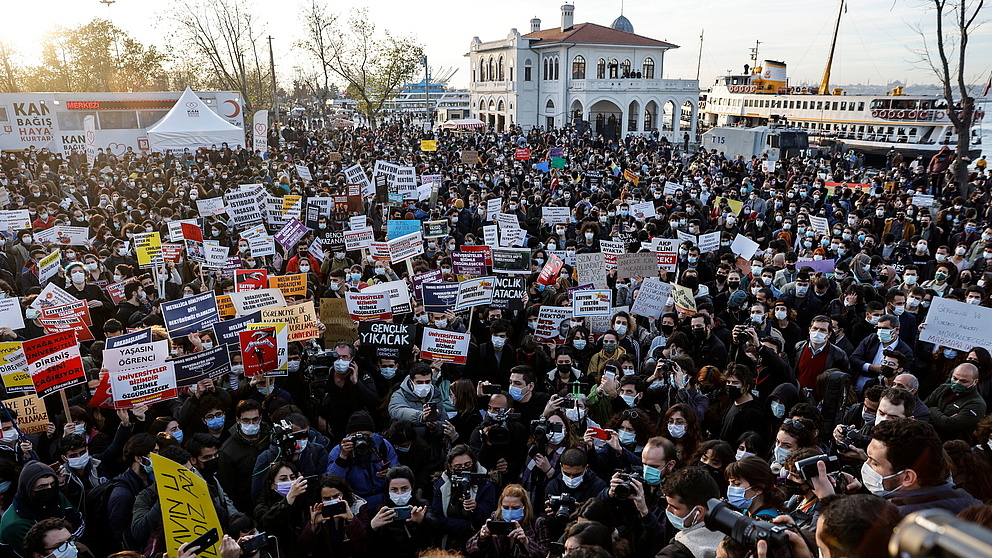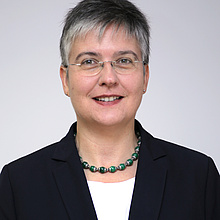updated on 28 January 2021


Contact
Press, Communications and Marketing
Tel.: +49 228 833-144
Fax: +49 228 833-441
presse[at]avh.de
Following the end of the regular term of office of the previous rector of Boğaziçi University in Istanbul, President Recep Tayyip Erdoğan of Turkey appointed a new rector – the public finance expert Melih Bulu – in early January 2021. Boğaziçi University is a state-owned university. It is considered to be one of Turkey’s most renowned educational institutions and is regarded as liberal. This is also due to its international orientation: it has partnerships with many prestigious universities around the world.
“The appointment was an entirely top-down decision that ignored the university’s demands and needs”, said a Turkish source who had conferred with colleagues at Boğaziçi University and asked to remain anonymous. The current appointment cannot be compared with the previous appointment made in 2016, our source said, explaining that Turkey no longer has a state of emergency today and the faculty rightfully expected that a new consultation process would be conducted in 2021. The politization of the appointment process plus the current rector’s political identity go totally against the required objective and academic character of a university administrator, the speaker commented. Our source said, that after the return to parliamentary democracy in 1990s, Boğaziçi University lead in the civil movement for passing a new law in the parliament that introduced the due process for faculty consultation in public universities that are financed with state funding through faculty elections of potential candidates for the final appointment by the President of the Republic. That law worked quite well for more than twenty years and firmly established a procedure of consultation between the state and the public university faculty.
The observer described the demonstrations undertaken by students at Boğaziçi University – and the silent protests by faculty members who every day stand in their official robes on the main quad with their backs turned to the rector’s office building. In the weeks since the appointment, faculty members have also refused to accept official appointments or attend meetings that are called, the source reported, adding that members of the university senate are working hard on proposals for solutions to the ongoing crisis which has brought the daily workings of the university to a standstill.
At the moment, the observer added, there seems to be no hope that the decision will be reversed. “As long as the president retains the right to appoint university rectors without the involvement of the universities themselves, a different, new rector would be just as unacceptable as the present one. Changing the rector appointment rules will be a long struggle”, the voices from Istanbul concluded.
“As long as the president retains the right to appoint university rectors without the involvement of the universities themselves, a different, new rector would be just as unacceptable as the present one. Changing the rector appointment rules will be a long struggle.”
For an additional take on this situation, fellow Humboldtian and constitutional law scholar Ece Göztepe, dean of the Faculty of Law at Bilkent University in Ankara, answered several questions on this matter.
Humboldt Foundation: Ms. Göztepe, in Germany the constitution guarantees freedom of research and teaching. The authority to call and appoint professors lies with the individual universities and academic self-governance is essential. What is the legal situation in Turkey?
Ece Göztepe: University autonomy like what we are familiar with in Germany does not exist in Turkey today. In fact, in the years since the constitution of 1982 went into force, Turkey’s universities lost the autonomy that the constitution of 1961 had once guaranteed them.
Universities were already a thorn in the side of the political sector even before the military putsch on 12 September 1980 because, back then, both the student body and teachers freely expressed their criticism and could not be brought back into line with the government’s political course. However, the current constitution from 1982 placed all universities under the supervision of the Turkish Council of Higher Education (YÖK), the central state supervisory body for Turkish universities.
According to Article 131, para. 1 of the Turkish constitution, the Turkish Council of Higher Education was established “to plan, organise, administer and supervise education provided by institutions of higher education, to orient teaching activities, education and scientific research, to ensure the establishment and development of these institutions in conformity with the objectives and principles set forth by law, to ensure the effective use of the resources allotted to the universities, and to plan the training of the teaching staff”.
Prior to this time, new rectors at Boğaziçi University were normally chosen from among the ranks of its professors. What does the present appointment of Melih Bulu mean?
The procedure laid down in the Law on Higher Education for choosing a new rector was changed several times. Even though the practice of having the entire teaching staff elect new rectors from their own ranks was enshrined in law only between 2008 and 2016, this tradition of university autonomy continued to be practised at established, prestigious universities without a legal basis. The high quality of education these universities provided legitimised the continuation of this ‘good practice’. To be honest, it should be a matter of course for academic bodies that the person holding a university’s highest office also be familiar with that particular institution’s culture.
Defending traditional rights requires a resolute and committed university administration, and teachers who attach great importance to the continuation of traditions. Turkey currently has 203 universities. A total of 130 of them are state-owned and the remaining are privately funded universities. The sheer number of universities and the quality differences between them makes it increasingly difficult to achieve good practice. And, for a government that wants to suppress all opposition and diversity, this situation offers a welcome opportunity to make it a thing of the past.
Actually, the break with tradition took place prior to this – namely, in 2016 when the Turkish Council of Higher Education chose not to recommend the person who received the most votes from the teaching staff at Middle East Technical University (METU) to be president of the university and Turkey’s president then appointed the Council’s candidate.
Not only is Melih Bulu not a member of the university, he is a politician – and has even campaigned for the AKP. How do you view the connection between the political sector and science? What do these actions mean for freedom of research and teaching?
From a legal standpoint, university teachers may be active in a political party. The constitution says: “The membership of the teaching staff at higher education institutions in political parties is regulated by law. This law cannot allow those members to assume responsibilities outside the central organs of the political parties. It also sets forth the regulations which the teaching staff at higher education institutions shall observe as members of political parties.”
The Law on Higher Education also provides that faculty members in higher education institutions who are active in the central organs or research and advisory units of a political party cannot serve as a rector of a higher education institution.
As far as is publicly known, the newly appointed rector of Boğaziçi University campaigned for the AKP during the parliamentary elections in 2015 and previously played a leading role in the establishment of a district group. However, he currently does not hold any further positions in the party. Consequently, according to the law he can be chosen to be the rector.
However, I am of the opinion that we can’t view the situation in the Turkish context solely from a legal standpoint. Apart from the fact that Bulu was not a member of the teaching staff at Boğaziçi University, he had just been appointed rector at the newly established Haliç University in January 2020. Why would anyone who has held this office for just one year switch to one of the best universities in Turkey, a university whose educational tradition he is not familiar with and where he is not a member of the teaching staff? Given that the underlying law does not even require candidates to apply to the Council of Higher Education but instead allows them to be directly appointed by the country’s president, we can speak of a political mission that is probably not conducive to the liberal atmosphere at Boğaziçi University.
The entire teaching staff protested against the appointment in an open letter. The students call the new rector a “compulsory administrator”. What can these protests achieve? Do you have any hope that the decision will be rescinded?
Quite a number of protests during the last 20 years in Turkey have unfortunately shown that the right of assembly – if it can be exercised at all – is a one-way street. Unfortunately, protests directed at the government have no effect and I believe there won’t be any exception to this in the case of Boğaziçi University. But this doesn’t mean that people should forego protests. Protests are important for maintaining tradition and also as a way to publicly express a critical opinion.

The legal scholar Ece Göztepe was a Humboldt Research Fellow in 2012-13 when she was a guest at the Freie Universität Berlin and hosted by Professor Philip Kunig. She teaches Turkish and comparative constitutional law at Bilkent University in Ankara, Turkey, and is a member of the German-Turkish Lawyers Association and numerous professional societies. In addition, she served as the Humboldt Foundation’s Ambassador Scientist in Turkey from 2014 to 2020.
